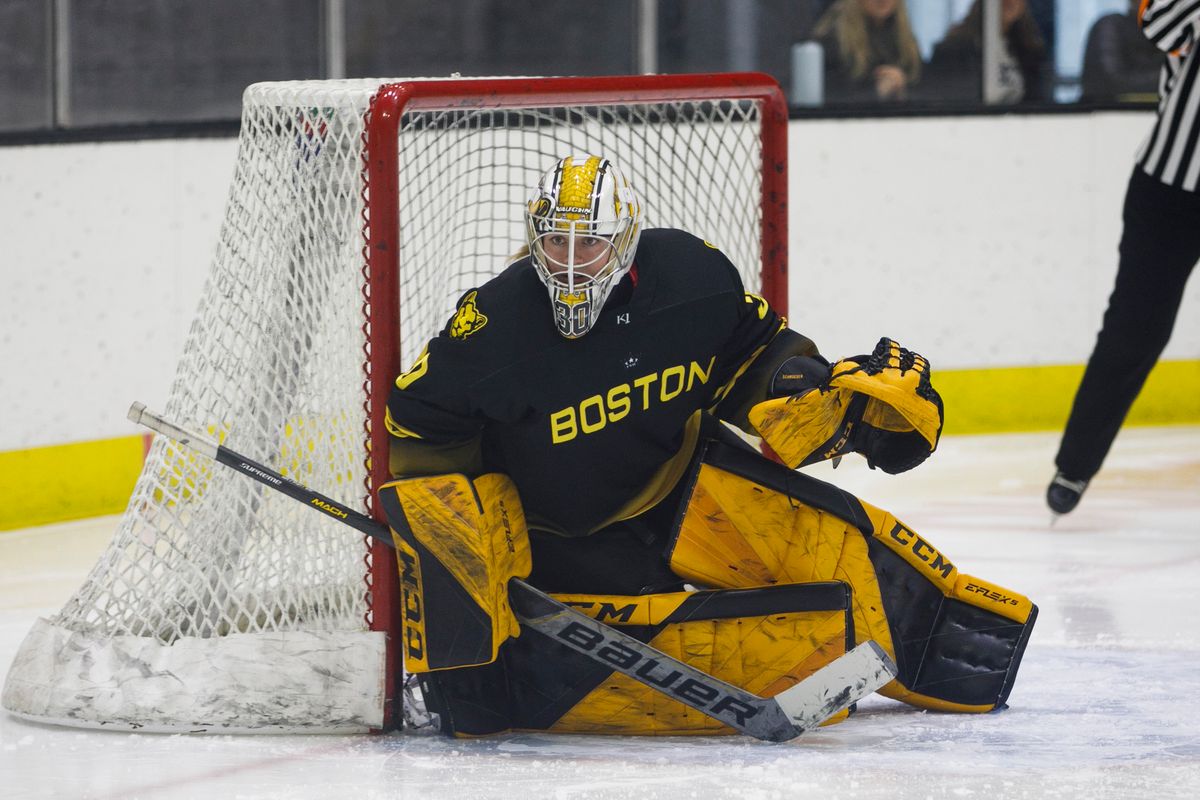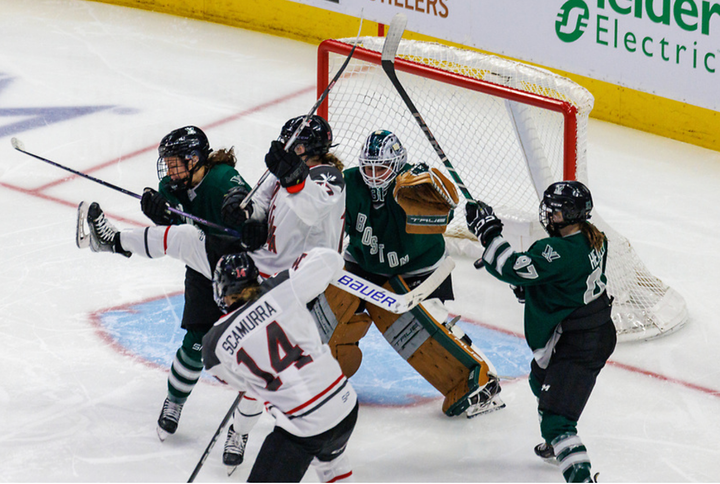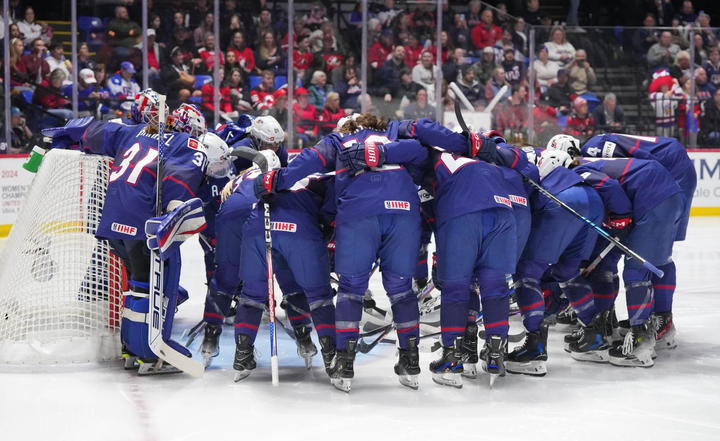Contenders for the 2023 PHF MVP award
It’s the time of the year for regular season Premier Hockey Federation awards, and there is a lot of competition.

It’s the time of the year for regular season Premier Hockey Federation awards, and there is a lot of competition. I’m going to examine the PHF’s public stats to get an idea of the contributions and value some of the best in the league added to their teams this season, and draw up a list of potential contenders for the Most Valuable Player award.
In previous years, the PHF has considered one finalist from each team for this award. The benefit there is that you can reward excellent individual performances even on teams that didn’t have overall success. For an individual award, that’s important. However, it overlooks the fact that you could have more than one truly elite performance on a team.
For this article, I’ll split the difference by looking through the top contributions on every team and curating a list of top contenders for the award.
Loren Gabel, F, Boston Pride
Loren Gabel had a momentous season by any measure. Finishing with the triple crown of most points, goals, and assists league-wide at 20-20–40, she also led the PHF in points per game (1.8) and shots on goal (146). She finished with a point on 43.5% of her team’s goals, personally scoring 21.7% of them.
Gabel is the obvious choice for an MVP award. It’s easy to point to the highest-scoring player on the best team, or the person who scored the most goals or points, and Gabel is all of those people. But thinking about the most "valuable" player, to me, means not just what a player brings, but also the position their team would be in without them.
If the Boston Pride didn’t have Gabel, they wouldn’t fall out of playoff contention. They might not have the overall seed. They might not have led the league with a +40 goal differential, 15 more than second-place Toronto. That’s why I’m also looking at the percentage of her team’s offense Gabel contributed on. Alongside Jillian Dempsey and Élizabeth Giguère for much of the season, Gabel had the perfect support to provide an incredible amount of her team’s offense. Those numbers mean more to me than overall points, and comprise an excellent argument for Gabel for MVP.
Corinne Schroeder, G, Boston Pride
What does it take for a goalie to win MVP? In a league where advanced stats and analysis are hard to come by publicly, a goalie would have to demolish the eye test or counting stats in order to challenge some of the high-octane scoring we see across the PHF, and that’s exactly what Corinne Schroder has done. In her first year as a pro, Schroeder set single-season records in wins, shutouts, and saves. She also, if my sources are correct, set the record for career shutouts in her first year, with eight shutouts to Amanda Leveille’s seven, which were accumulated over seven seasons. Schroeder led the Fed in wins, goals against average, and save percentage by a wide margin, while adding two assists. She saw an average of 36.22 shots per game.
Without shot location data, it’s difficult to compare goaltenders’ workloads beyond shot volume. Without differentiated data for even-strength, PP, and PK shots and goals against, it’s hard to say whether a goaltender is at a disadvantage in certain situations in ways that might be related to the skaters in front of them. I can’t say that we have the data to talk about exactly how good Schroeder was this season, but I can say that she made as strong of a case for a goaltender to win MVP as anyone has ever made, or maybe could ever make with the current data.
Finally, the question of value brought to the team. I’ve heard it said before that the Boston Pride always have extremely high-caliber goaltending, and there’s no doubt about that. But goalies are also dependent on the play of the skaters in front of them to drive those stats. The Boston Pride scored more goals per game this year than any other team, at 3.8. Without Schroeder, they would have led with the 2019-2020 Goaltender of the Year, Lovisa Selander, and I don’t think they would have struggled for a playoff berth in that situation.
Kennedy Marchment, F, Connecticut Whale
A year after winning the 2021-2022 MVP award, Kennedy Marchment decided to run it back. Finishing with 17 goals and 18 assists for 35 points in 24 games, the Ontario native was second league-wide in points, goals, assists, and shots on goal. She was first in the Fed with a stunning six game-winning goals, twice as many as any player aside from Dempsey, who had four. She was second in points per game (1.5) and tied for second in shorthanded goals with two. Marchment had a point on 42.2% of her team’s goals, and scored 20.5% of them personally.
For the Connecticut Whale, Marchment became the franchise leader in all-time points, goals, points per game, points per season, and goals per season, to add to her record from last year of assists per season. And finally, she set a new league record for points streak with a goal or assist in 18 straight games, and became the first player in league history to have back-to-back 30-point seasons.
The great story for Connecticut last season and this season was Marchment’s connection with the 2021-2022 Newcomer of the Year, Taylor Girard. One of the dynamic duos of the PHF, this pair shared a line at different points of the season with Caitrin Lonergan, Justine Reyes, and Alyssa Wohlfeiler. The Whale heated up in the latter half of the season, with a number of players finding their scoring touch, but before that, it was largely Marchment and Girard carrying a significant responsibility for the team’s scoring. I don’t know if Connecticut is a number-three seed, with a convincing chance of challenging Toronto for a spot in the finals, without Marchment on that top line.
Mikyla Grant-Mentis, F, Buffalo Beauts
This is where the debate comes in about what it means to be an MVP. At 14th overall in league scoring, Mikyla Grant-Mentis is not challenging for the goal- or assist-scoring titles. She finished the season with an impressive but not overwhelming 9-12–21 in 24 games, a departure from her 30-point season last year or the five goals in six games that earned her the MVP award in 2020-2021. But Grant-Mentis wasn’t playing on the same team where she hit those marks, and her contributions to her team this season must be observed in that context.
At 14th overall, Grant-Mentis is the only player on the Beauts in the top 25 for scoring, with veteran Claudia Kepler following her up at 27. Grant-Mentis and Kepler were the only Beauts in double digits on either goals or assists. Grant-Mentis had a point on 42.0% of her team’s goals, and scored 18.0% of them personally. She also blocked 15 shots, which is second on her team and second among forwards in the league, only one behind teammate Dom Kremer and the Pride’s Dempsey, who each recorded 16.
Grant-Mentis has comparable marks on offensive percentage to Marchment and Gabel, but on a team that scored much less often. If you took Grant-Mentis out of this lineup, the Beauts would suffer much more than if you took Gabel or Marchment away from the Pride or Whale. However, Grant-Mentis’s 20 penalty minutes are much higher than either of those players, especially relevant when she is on the top penalty killing unit and the Beauts had the most penalties in the league this year.
Taylor Girard, F, Connecticut Whale
Last year’s Newcomer of the Year picked up where she left off and finished fourth in the league scoring race. With four power-play goals and four shorthanded goals, Taylor Girard was a special teams monster. She played on Marchment’s wing all season, and they have continued developing their chemistry that saw them each take home an award last year. Girard had a point on 33.7% of her team’s goals and scored 12% of them personally.
There’s no doubt that Girard had an extremely impressive season or that the team would be worse off without her, but she’s unlikely to get many MVP votes when she’s on the same team as a player who also had an impressive season, but had seven more points, all of them goals. The advantage for the observer is that if you’re going to say that the league’s fourth-overall scorer isn’t an MVP candidate, that sets a pretty high bar for who else can receive consideration. For every other player on this list, the question has to be asked, did they contribute more than the league’s fourth-leading scorer?
Shiann Darkangelo, F, Toronto Six
The overall scoring race really makes it difficult to isolate MVP candidates this year because of how well sets of teammates did together. Gabel and Dempsey are first and third, Marchment and Girard are second and fourth. Brittany Howard, Shiann Darkangelo, and Emma Woods are fifth, sixth, and seventh, respectively, and within three points of each other. They spent time together as a line, all on different lines, and together in different pairings. The eye test isn’t especially helpful either, to my mind, as each player made impressive contributions in skills other than finishing. Any of them could make an argument for MVP in isolation, but Darkangelo is my pick.
What puts Darkangelo a head above the rest is her faceoff skills. She took the most faceoffs in the league with 552, more than 50 ahead of Dempsey in second. Darkangelo had a win rate of 61.2% which is, to put it colloquially, totally bonkers. It’s the highest rate in the Fed among players to take at least 60 draws. When you put the puck on your teammate’s stick to start the play with possession 60% of the time, you’re giving your team a massive opportunity to control the play. Darkangelo did have 16 penalty minutes, which isn’t ideal, but she had three game-winning goals as well.
With a final scoring tally of 12-13–25, she had points on 28.7% of her team’s goals and scored 13.8% of them personally, which is lower overall than some of the other MVP candidates. The moral of the story is that it’s hard to stand out on a team with as much scoring depth as the Six, but I don’t think any of their players would complain about that.
Brittany Howard, F, Toronto Six
Brittany Howard came into the PHF like a wrecking ball. She had 16 goals and eight assists in her first 14 games. Her offense took a hit after the All Star Game and she took time out for injury, which is disappointing to those of us on MVP watch, because without the injury her goal-per-game pace was the best in the league. You can’t blame a player for getting injured, but simultaneously it’s hard to contribute value to the team from the stands. Still, she made quite a case for herself prior to the injury.
Finishing the regular season with 16-10–26, Howard had a point on 29.9% of her team’s goals, and scored 18.4% of them personally. That’s while missing four games due to injury. No doubt she would have been even more of a factor otherwise. In a short season, a few games can have that kind of effect, but stats are not the only thing voters look at for determining these awards, so I’d say she still has a decent shot.
Ann-Sophie Bettez, F, Montréal Force
The captain of an expansion team, Ann-Sophie Bettez had a lot of weight on her shoulders, and she carried it extremely well. On the top line for every game, she finished the season with 11 goals and 11 assists. The Force only scored 56 goals this year, second-worst in the league. Bettez had points on 39.3% of them and scored 19.6% of them personally.
As one of only two players on la Force to score more than 15 points, it’s clear that Bettez brought immense value with that aspect of her game. Aside from finishing skills, she was also a playmaker and deft and tricky defensively. If you took her off this team, they would look significantly worse, with a strong possibility of dropping to last in the league. The confounding variable for her MVP nomination is her teammate, Jade Downie-Landry. These two played together for the whole season, at even-strength and on the top power-play unit, and finished with nearly identical stats. It’s hard to say that one deserves the nomination more on that basis, but I give Bettez the nod for having fewer penalty minutes, and for the "intangibles" — which I found were actually pretty tangible as an observer this season. Bettez is not only a great player, but also a great leader, and that’s what the Force needed in their inaugural season.
I don’t think Bettez will get many votes for MVP, because she came in ninth in the overall scoring race and her team didn’t make the playoffs. But to me, she deserves the nomination and consideration.
Jonna Albers and Natalie Snodgrass, Fs, Minnesota Whitecaps
Both of these forwards finished the season with 10 goals and 10 assists. They each have multiple game-winning goals. They each had 20 points on a team where only five players were in double digits. They each had a point on 34.5% of their team’s goals, and scored 17.4% of them personally. Solid MVP consideration numbers, but who gets the edge?
Snodgrass has fewer penalty minutes and had an impressive faceoff win rate in the low number of draws she took, and she played two fewer games than Albers to get those numbers. That’s not exactly an overwhelming argument, and I find it hard to give either the edge from the eye test. At the end of the day, while the Whitecaps would undoubtedly be worse off for losing either of these players, I don’t think it’s likely either of them will get many MVP votes.
Minttu Tuominen, D, Metropolitan Riveters
The Riveters had a brand-new team this season, with only three returning players. They struggled at various times in the season, really only seeming to come together in the final stretch. In bulk scoring, no one on the team stands out, but Minttu Tuominen broke a league record for power-play goals from the blueline, and her nine goals on the season is second in league history from the position.
With nine goals and five assists, Tuominen came in fifth in the league for points among defenders and first in goals. First place in a single stat isn’t enough for an MVP nomination, but we don’t have a lot of stats fit for measuring the impact defenders have, so we have to look a little closer. Tuominen played a ton of minutes for the Rivs and took a lot of shots from the point. On the powerplay, her shot was one of their best weapons, and she was defensively reliable. For a team struggling to come together in a short season, a 1D who is great on offense and defense and eats minutes can be your most valuable player. It doesn’t hurt that she also spent years playing at forward and was able to shift into that position for the Riveters when coverage was needed.
I don’t think we’ll see any defenders get MVP votes, excepting the chance of an immense scoring season, until we get better stats to help quantify a player’s contributions from that position. If anyone deserves them, it would be Tuominen.
In summation
Times like this are when I wish we had more advanced stats for this league. There are a number of impressive defenders and defensive forwards who will likely never get the recognition they deserve, and goalies are likely to be judged heavily on their records rather than their situations. Until then, counting stats and the eye test are what we’ve got.
I think Loren Gabel is the most likely winner of the MVP award. Depending on who gets to vote, we might see a lot of votes that come down to pure scoring. If voters look at goalies, Corinne Schroeder might get a good amount of votes, but Gabel will split the attention. Kennedy Marchment will be on a lot of lists, and Brittany Howard made an impact with lots of goals early in the season, so she also might be on voters’ minds despite falling back in the scoring race in the latter half of the season.
There is so much talent in this league, and we need more ways to properly measure player contributions. Whoever ends up being the finalists and the eventually winner of the award, they will have thoroughly earned it.





Comments ()